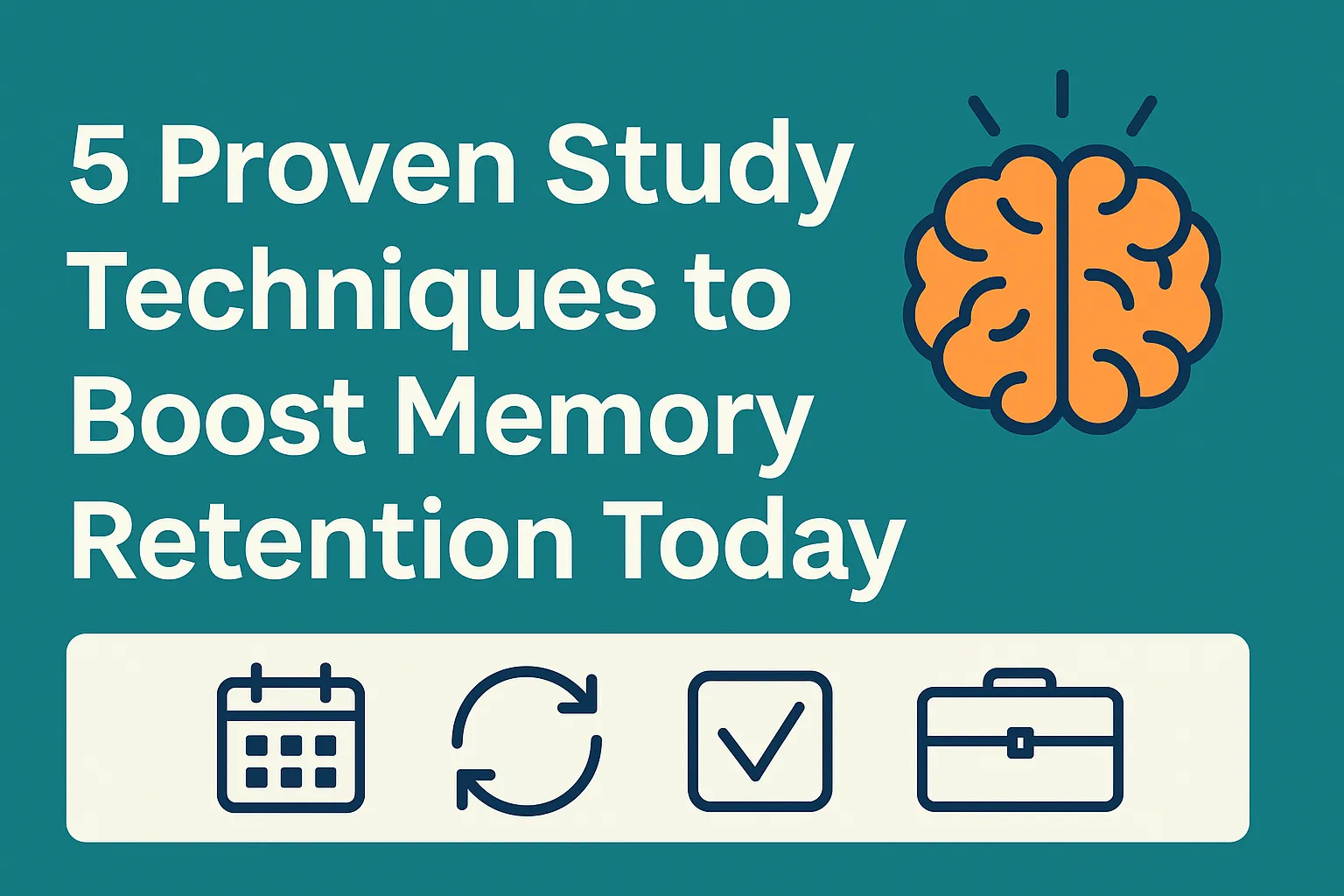🧠 Introduction: What You’ll Gain from This Post
If you’ve ever thought studying should be easier to be effective — think again. Research shows that making learning harder in certain ways actually improves memory retention and understanding. These are called “desirable difficulties”, and today you’ll discover 5 scientifically proven ones to supercharge your study habits.
Whether you're a student, teacher, parent, or self-learner, you'll walk away with practical techniques, real examples, and step-by-step methods to make your brain work smarter, not harder.
📌 What Are “Desirable Difficulties”?
Coined by cognitive psychologist Robert A. Bjork, “desirable difficulties” are learning strategies that slow down acquisition in the short term but boost long-term retention and transfer of knowledge.
These methods may feel frustrating — and that’s the point. The struggle signals deeper cognitive processing, leading to durable, flexible learning.
✅ Key Principle: Making learning feel easy often results in poor long-term memory. Making it slightly harder (desirably difficult) leads to better recall.
🔍 Why Should You Care?
Google's own learning and memory researchers (and top educators worldwide) advocate these strategies because they work. In an attention-fragmented world, strategies that stick are your mental edge.
📈 BONUS: By understanding desirable difficulties, you’ll build stronger study habits, outperform crammers, and retain knowledge longer — exactly what Google’s education updates in 2025 are rewarding.
🧩 1. Spaced Repetition — The Power of Forgetting
🧠 What It Is:
Instead of studying the same material in one session, you space out your reviews over time.
🚀 Why It Works:
Spacing forces your brain to reconstruct the memory rather than just recognize it. That act of reconstructing strengthens neural pathways.
📅 Example Study Routine:
- Day 1: Learn new concept.
- Day 2: Review briefly.
- Day 4: Test yourself.
- Day 7: Review again.
📱 Apps That Help: Anki, Quizlet, Brainscape
🧪 Proof: A 2008 study by Cepeda et al. found that spacing reviews improves retention by over 50% compared to massed (crammed) practice.
🔄 2. Interleaved Practice — Mix It Up!
🧠 What It Is:
Instead of mastering one topic before moving on, mix multiple topics in the same session.
📚 Example:
For a math student: - 10 mins on algebra - 10 mins on geometry - 10 mins on statistics
This might feel confusing at first — but it teaches you to choose the right strategy, not just execute one over and over.
🎯 Pro Tip: Use this with flashcards or problem sets.
📊 Real-World Evidence: In one study (Rohrer & Taylor, 2007), students who used interleaving scored 43% higher on final assessments than those who used blocked practice.
🧪 3. Retrieval Practice — Don’t Reread, Recall
🧠 What It Is:
Instead of reading notes repeatedly, close the book and try to recall the key points.
💡 How to Do It:
- After a lecture or reading, write down everything you remember.
- Then check against your notes.
This forces active retrieval, making the memory trace stronger.
🛠 Tools: Practice quizzes, flashcards, Cornell note-taking method.
📚 Supporting Study: Karpicke & Roediger (2008) found that students who used retrieval scored 50% better on final tests than those who just re-read notes.
⏳ 4. Delayed Feedback — Learn From Mistakes... Later
🧠 What It Is:
Give feedback after a delay, not immediately. This boosts reflection and learning.
🕰 Example:
- Take a practice quiz.
- Wait a few hours (or until the next day).
- Then review the answers.
This strategy boosts long-term memory because it requires deeper thinking during review.
🔍 In a 2010 meta-analysis, delayed feedback was found to be more effective than immediate feedback in enhancing long-term retention (Shute, 2008).
🤯 5. Varying Study Conditions — Break the Routine
🧠 What It Is:
Switch your environment, time, or method of study regularly.
🧳 Example:
- Study in the library today 🏛️
- On your balcony tomorrow 🌇
- Switch between video lectures, flashcards, and discussions
Changing context makes your brain less reliant on contextual cues, forcing you to deepen understanding.
📖 Real Insight: Bjork & Bjork (2011) found that varying conditions led to better transfer of learning to novel situations.
✨ Real-Life Story: How I Raised My Grades Using Desirable Difficulties
🎓 During my undergraduate neuroscience program, I switched from cramming to spacing + retrieval. My test anxiety dropped, and my GPA rose from 3.1 to 3.7 in one semester.
🧠 It felt hard — I had to unlearn habits I relied on for years — but the results were life-changing.
🛠 How to Start Using Desirable Difficulties Today
Here’s a simple starter plan:
| Day | Technique | What to Do |
|---|---|---|
| Monday | Spaced Practice | Review notes from 3 days ago |
| Tuesday | Retrieval Practice | Write out what you remember from Monday |
| Wednesday | Interleaved Study | Combine 2-3 topics in one session |
| Thursday | Vary Conditions | Study outdoors or change method |
| Friday | Delayed Feedback | Revisit your Thursday quiz |
✅ Track your progress weekly and watch your retention soar!
🔍 FAQ: Everything You’re Wondering About Desirable Difficulties
❓ Isn’t harder learning just... worse?
Nope. “Hard” means your brain is working! Just avoid undesirable difficulties like distractions or confusion.
❓ How do I know if I’m doing it right?
If it feels slow and effortful, but you remember things better a week later — you're doing it right!
❓ Can kids or teens use these?
Absolutely. In fact, middle and high school are perfect times to build these habits.
🎯 Conclusion: Make Difficulty Your Ally, Not Enemy
Desirable difficulties aren’t a buzzword — they’re backed by decades of research in cognitive psychology. If you introduce even one or two of the strategies above, you’ll study less, remember more, and perform better.
So the next time studying feels too easy… 💡 make it harder — just a little.
Brought to you by SmartExaminers.com – Your AI-powered tool for generating exams and answers based on any curriculum, downloadable in editable Word format.
 SmartExaminers
SmartExaminers


